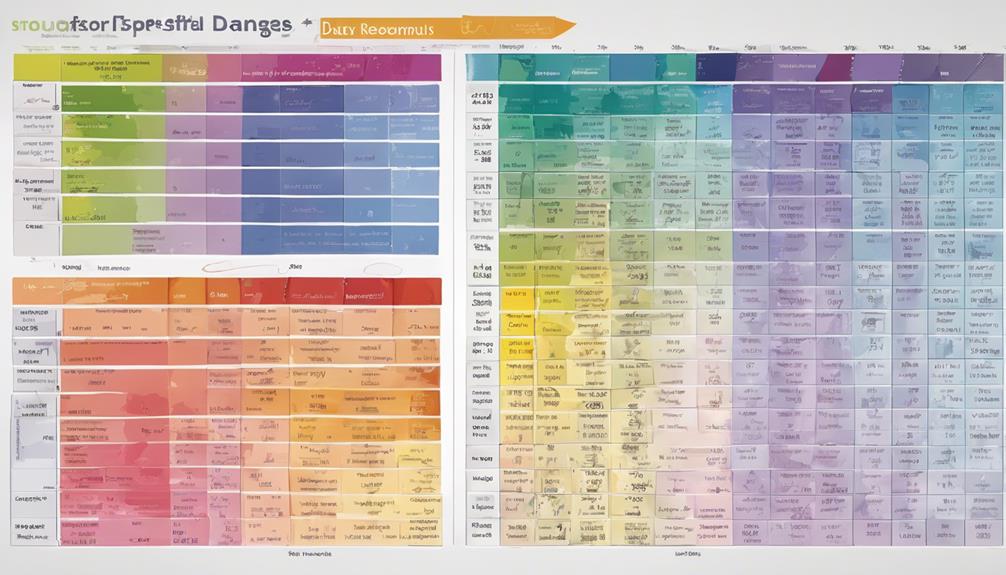When it comes to plasma donation while breastfeeding, it is crucial to take into account specific factors to ensure the well-being and safety of both the nursing mother and her baby.
Understanding the guidelines and recommendations surrounding this topic is essential for making informed decisions.
As we explore the intricacies of plasma donation in relation to breastfeeding, we uncover vital insights that can help navigate this balancing act effectively.
Key Takeaways
- Wait at least 9 months postpartum before considering plasma donation.
- Consult healthcare provider to ensure donation safety while breastfeeding.
- Hydration is crucial to maintain milk supply when donating plasma.
- Understand and follow specific guidelines to balance breastfeeding and plasma donation.
Plasma Donation Guidelines for Breastfeeding Mothers
As breastfeeding mothers considering plasma donation, it's important to understand the guidelines provided by healthcare professionals for ensuring the safety of both mother and child. Plasma donation can affect electrolyte levels in nursing mothers, potentially impacting milk supply. WHO recommends waiting at least 9 months postpartum before donating plasma while breastfeeding to minimize potential risks.
Consulting a healthcare provider before donation is essential to assess individual health and guarantee the well-being of both mother and baby. Due to pregnancy-related complications, testing for human leukocyte antigens may be necessary before donation. It's crucial to note that donation centers may have differing policies regarding postpartum donation, making it essential for breastfeeding mothers to carefully consider where they choose to donate.
Safety Considerations for Breastfeeding and Plasma Donation

Considering the safety implications of both breastfeeding and plasma donation is essential for mothers looking to contribute while nurturing their child. When contemplating plasma donation while breastfeeding, it's important to keep in mind that the World Health Organization (WHO) recommends waiting at least 6 months post-childbirth before proceeding. This waiting period allows the body to stabilize after childbirth and establish a good milk supply for the baby. Plasma donation can temporarily reduce fluid volume in the body, which may affect milk supply. To counter this, maintaining adequate hydration levels is critical to support milk production before and after donation. Consulting with a healthcare provider before donating plasma while breastfeeding is highly recommended to address any individual concerns or risks. It's advisable to guarantee a stable milk supply and a well-established breastfeeding routine before considering plasma donation to safeguard both maternal and infant health.
| Safety Considerations | Breastfeeding | Plasma Donation |
|---|---|---|
| Timing | At least 6 months post-childbirth | Wait for professional advice |
| Hydration | Stay adequately hydrated | Important for recovery post-donation |
| Consultation | Talk to healthcare provider | Address individual concerns |
| Milk Supply | Ensure stable supply before donation | Can be affected temporarily |
| Routine | Well-established breastfeeding routine | Maintain routine for stability |
Pro Tips for Donating Plasma While Breastfeeding
To optimize the experience of donating plasma while breastfeeding, it's essential to prioritize adequate hydration and nutrient intake.
- Stay Hydrated: As breastfeeding moms, it's important to drink plenty of fluids before and after donating plasma. Proper hydration supports milk production and helps maintain your overall well-being during the donation process.
- Nutrient-Rich Diet: Consuming a balanced diet rich in nutrients, especially iron, can help prevent anemia and make sure you're in top health for donating plasma. This is essential for both your well-being and the quality of the plasma being donated.
- Avoid Dehydration: Before heading to the donation center, make sure to avoid dehydration by drinking enough water. Dehydration can impact the donation process and your milk supply, so staying adequately hydrated is key for a successful donation experience.
Eligibility Criteria for Donating Plasma During Breastfeeding

When determining eligibility for donating plasma while breastfeeding, it's essential to adhere to specific guidelines set forth by donation centers and healthcare professionals.
Most donation centers, like the Red Cross, typically require a waiting period of six weeks postpartum before individuals can donate plasma while breastfeeding. This waiting period allows time for your body to recover from childbirth and establish a stable milk supply for your baby.
It's important to contact the donation center directly to inquire about their specific eligibility criteria for donating plasma during breastfeeding, as requirements may vary.
Before considering plasma donation while breastfeeding, make sure that your milk supply is well-established to prevent any disruptions for your baby. Consulting with healthcare providers or lactation consultants can provide valuable guidance on whether donating plasma is suitable for you while breastfeeding.
If you have any concerns or questions regarding plasma donation during breastfeeding, don't hesitate to address them with the donation center or your healthcare provider for personalized advice.
Plasma Donation Frequency and Breastfeeding Compatibility
As breastfeeding individuals navigate the process of donating plasma, understanding the impact of donation frequency on milk production becomes an important consideration.
- Plasma donation frequency can vary, but it's typically recommended that donors wait at least 28 days between donations to allow their bodies to replenish the lost fluids and nutrients.
- Donating plasma while breastfeeding may lead to a temporary decrease in milk supply due to the fluid loss experienced during the donation process.
- Adequate hydration before and after plasma donation is vital for maintaining milk production levels while safeguarding the well-being of both the breastfeeding individual and their baby.
Maintaining hydration levels is key to supporting milk production and overall health. It's important to consult with a healthcare provider before donating plasma while breastfeeding to ensure it's safe for both you and your baby. Plasma donation centers may also have specific guidelines tailored to breastfeeding individuals, so it's best to inquire about any additional recommendations they may have.
Frequently Asked Questions
What Happens if I Donate Plasma While Breastfeeding?
If I donate plasma while breastfeeding, our milk supply could decrease temporarily due to fluid loss. Crucial to stay hydrated before and after donation to support milk production. Consult healthcare providers for guidance.
Why Can't Mothers Donate Plasma?
We avoid donating plasma while breastfeeding as it can affect milk supply. Plasma donation may lead to dehydration and alter electrolyte balance essential for milk composition. The strain from donation could impact the demands of breastfeeding.
How Long After Having a Baby Can I Donate Plasma?
We should wait at least 6-9 months postpartum before donating plasma, following WHO and country guidelines. Consulting a healthcare provider is essential for safety. Plasma donation can affect electrolyte levels and milk supply, so careful consideration is needed.
Can a Breastfeeding Mom Donate Blood?
Yes, breastfeeding moms can donate blood. Guidelines vary, but waiting 6 weeks to 9 months postpartum is generally recommended. It's important to follow regional recommendations and consult healthcare providers for personalized advice. Your donation can save lives.
Is it safe to donate plasma while breastfeeding during National Breastfeeding Month?
Donating plasma while breastfeeding during National Breastfeeding Month means mothers should consult their healthcare provider. It’s important to ensure that both the mother and the baby remain healthy and safe. National Breastfeeding Month emphasizes the importance of supporting breastfeeding mothers and their unique needs.
Conclusion
To sum up, donating plasma while breastfeeding is possible, but it's crucial to follow guidelines and prioritize safety. By staying hydrated, maintaining a stable milk supply, and consulting with healthcare professionals, breastfeeding individuals can contribute to plasma donation.
Remember, taking care of yourself and your baby is always the top priority. So, if you're considering donating plasma while breastfeeding, make sure to gather all the necessary information and support for a healthy and fulfilling experience.










